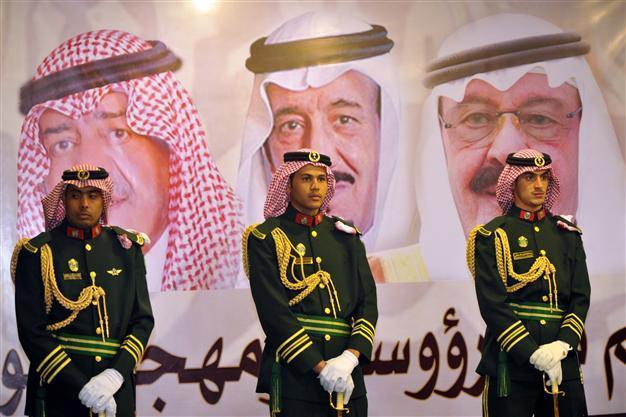Saudi downplays leaks as chequebook diplomacy revealed
DUBAI - Agence France-Presse

In this Feb. 18, 2014 file photo, Saudi royal guards stand on duty in front of portraits of King Abdullah bin Abdulaziz, right, then Crown Prince Salman bin Abdulaziz, center, and Muqrin bin Abdulaziz during a culture festival in Riyadh, Saudi Arabia. AP Photo
Thousands of diplomatic cables released by WikiLeaks reveal how Saudi Arabia apparently uses its deep pockets to buy international support, but the kingdom insists it is doing nothing out of the ordinary.The whistleblowing website has released about 70,000 documents it said were obtained from the Saudi foreign ministry, of more than half a million it says it received.
So far they paint what analysts say is the expected picture of a regional powerhouse courted for handouts and using its oil wealth to boost its influence.
Saudi officials have sought to downplay the leaks, while also warning citizens against websites posting "forged" cables.
A Saudi official told AFP the leaks contained "no surprises", and many dealt with personal matters instead of high-level diplomacy.
"Most of us were sad to see some personal issues going online," the official said.
The leaked cables, whose authenticity could not be confirmed by AFP, did reveal politicians and media organisations in Arab countries seeking cash in return for supporting Saudi policies.
One indicated that private Lebanese television channel MTV had been granted $2 million in funding in 2012 after asking for $20 million to fill a budget gap. In return, the channel was asked to support the kingdom "against opposing media".
Another cable showed the Saudi ambassador in Lebanon in 2012 recommending financial support to Lebanese Christian leader Samir Geagea after he complained of money problems.
Geagea has been vocal in supporting Riyadh's regional policies and its position on Syria while strongly opposing Lebanon's Iran-linked Hezbollah Shiite militia.
Other cables revealed that the foreign ministry would decide on granting visas to politicians and journalists based on their affiliations, excluding those suspected of opposing Riyadh's policies or linked to Tehran.
London-based analyst Abdulwahab Badrakhan said Riyadh had long been known for using soft power diplomacy to pursue its international aims and the leaks were not particularly damaging.
"The cables that have been published so far talk of issues that have always been known. There were no secrets revealed," Badrakhan said.
"There are no surprises or scandals that could trigger regional or international problems. For Saudi Arabia, the damage is limited," he said.
Many of the cables point to Sunni Saudi Arabia's regional rivalry with main Shiite power Iran.
In the Syrian conflict, Riyadh backs the rebellion against President Bashar al-Assad, who relies on direct support from Tehran and Hezbollah, which has sent thousands of fighters to prop up his regime.
In one cable the former Saudi foreign minister, Prince Saud al-Faisal, warned in 2012 that a visit to Lebanon by Qasem Soleimani, a top commander of Iran's Revolutionary Guard, had on its agenda discussing ways for Hezbollah to "gradually control Lebanon".
The leaked cables were published in Arabic by the Lebanese Al-Akhbar daily, which is close to Hezbollah.
"Those linked to Iran are the ones extremely happy to flaunt these cables," Badrakhan said.
Iran is itself no stranger to soft power diplomacy and Elie al-Hindi, a politics lecturer at Lebanon's Notre Dame University, said the cables hardly show the full picture.
"The cables only partially reflect the reality. Saudi rivals, mainly Iran, have their own channels to support opponents of Saudi Arabia," he said.
"Unfortunately, we live in a region that is rife with clientelism and foreign allegiances," he added.
The cables do offer some insight into the inner workings of the Saudi foreign ministry, in some cases having little to do with diplomacy.
One cable reveals how the Saudi embassy in Geneva was left holding the bill after a Saudi princess and her entourage left the Swiss city without paying a limousine charge of more than $1 million.
Another shows how the interior and foreign ministries were caught up in an argument over granting a visa for Lebanese pop star Nancy Ajram, who visited the ultra-conservative kingdom.
The interior ministry apparently protested after Ajram visited the kingdom, where concerts are banned. But the foreign ministry responded that Ajram received a visa as a dependant of her husband and that it was given following an invitation by a Saudi prince.
One cable even shows the son of late Al-Qaeda founder Osama bin Laden asking the United States for a death certificate after he was killed by US Navy SEALS.
Badrakhan said future releases of more cables could have more impact.
"We do not know if there are more important cables that deal with sensitive issues, like relations between Gulf countries, or (Saudi) relations with Washington and Russia," he said.
But diplomatic cables are unlikely to reveal any huge secrets, he said, given that it is the Saudi intelligence services and top figures in the royal court -- not the foreign ministry -- who handle the country's most sensitive affairs.
















